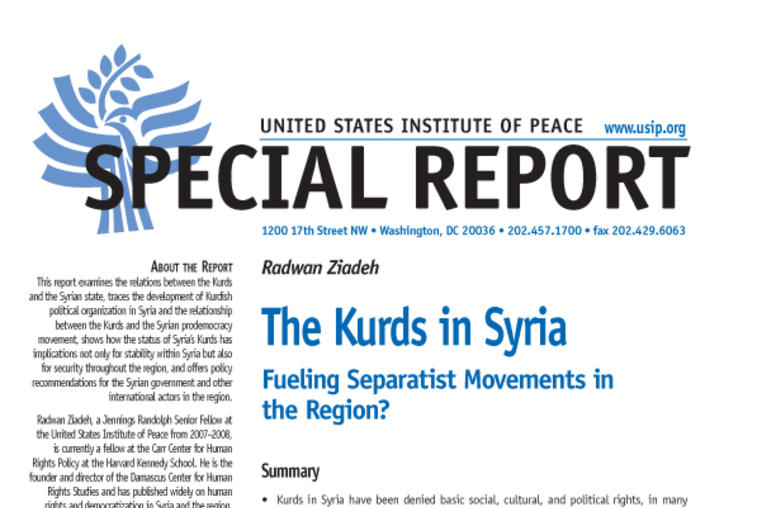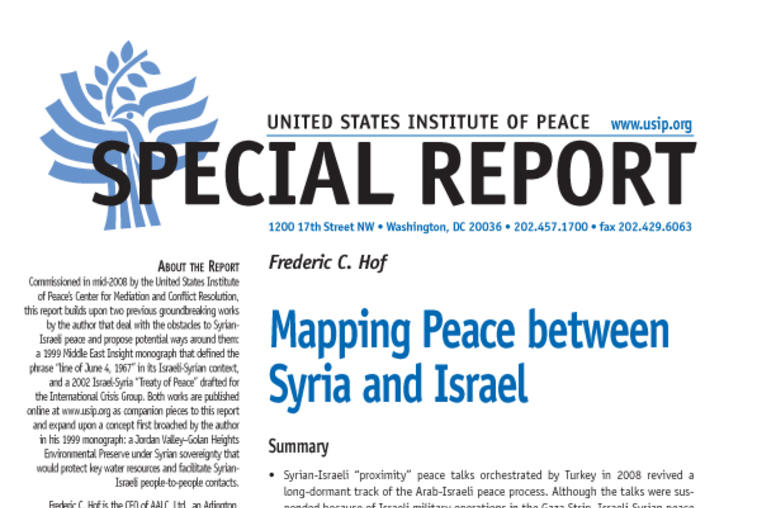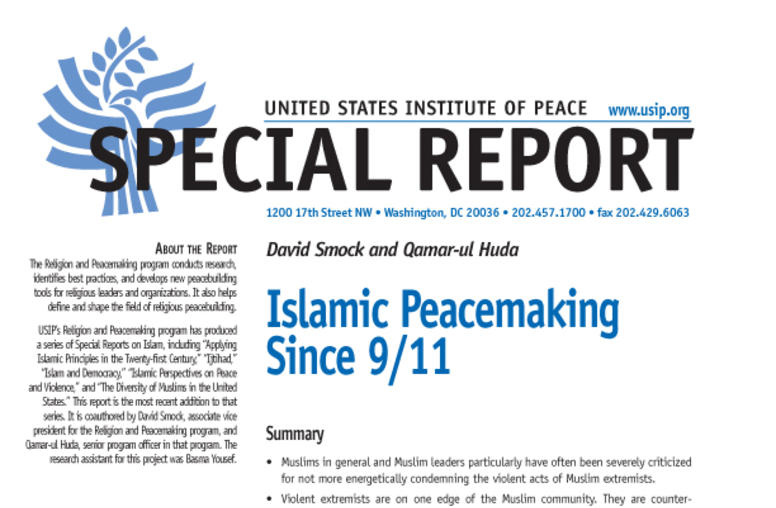Publications
Articles, publications, books, tools and multimedia features from the U.S. Institute of Peace provide the latest news, analysis, research findings, practitioner guides and reports, all related to the conflict zones and issues that are at the center of the Institute’s work to prevent and reduce violent conflict.

The Kurds in Syria: Fueling Separatist Movements in the Region?
The Kurds of Syria, in contrast to the Kurds of Iraq and Turkey, are little known in the West, but they have similarly strained relations with the state that governs them and face human rights abuses as a minority. The Syrian state’s repression of its Kurdish population, which thus far has not sought a separate state, may contribute to Kurdish claims for self-determination in Turkey, Iran, and Iraq.
Securing Afghanistan: Getting on Track
New USIP report, "Securing Afghanistan," strengthens case for urgent, sustainable reforms. This first-ever comprehensive analysis of international security assistance shows many donors have not met their Afghan commitments. A lack of focus on long-term sustainability, an inability to map the entirety of donor nations' security assistance programs and the subsequent failure on the part of the international community to understand precisely what is needed in Afghanistan are among the leading re...
Iraq, its Neighbors, and the Obama Administration: Syrian and Saudi Perspectives
Since 2004, USIP's "Iraq and its Neighbors" initiative has sponsored track II dialogues and ongoing research on relations between Iraq and its six immediate neighbors. As part of this work, the Institute--in partnership with the Stimson Center--sponsored a bipartisan, independent, and unofficial Study Mission to Syria and Saudi Arabia in mid-January 2009. The delegation met with a wide variety of leading political figures, businesspeople, NGOs and foreign policy experts in both countries, inc...

Mapping Peace between Syria and Israel
Although the Palestinian-Israeli “track” of the Arab-Israeli dispute remains at the heart of the conflict between Israel and its neighbors, the very complexity of that track (Jerusalem, refugees, borders, etc.) has led some to consider the Israeli-Syrian track to be relatively simple and straightforward. While simple it is not and straightforward it is only in relative terms, the Syrian-Israeli conflict can indeed be settled without prejudice to the central act of the Arab-Israeli drama.
Pakistani Public Opinion on Democracy, Islamist Militancy, and Relations with the U.S.
In this volatile election season in Pakistan, attention is once again turning toward Pakistani national identity, security, and foreign policy. To better assess the situation, USIP and WorldPublicOpinion.org conducted a joint public opinion survey of urban Pakistanis on a wide array of compelling policy questions.
Keeping an Eye on an Unruly Neighbor: Chinese Views of Economic Reform and Stability in North Korea
What is the nature of internal Chinese debate regarding North Korea? In the event of instability in the Korean peninsula, how would Beijing respond? Drawing on discussions with North Korea specialists during a Center for Strategic and International Studies-USIP delegation visit to the People's Republic of China, this report explores these and related issues.
Disabling DPRK Nuclear Facilities
While the October 3, 2007 Six-Party Talks accord outlines a roadmap for the disablement of North Korea’s core nuclear facilities, the specific details of the nuclear disablement process are still being developed. USIP’s Korea Working Group commissioned this Working Paper in order to facilitate a better understanding of nuclear disablement.
New Hopes for Negotiated Solutions in Colombia
Drawing from a series of conferences and events organized by USIP, this report examines the status of current peace initiatives in Colombia with the National Liberation Army (ELN) and the Colombian Revolutionary Armed Forces (FARC). It also assesses the paramilitary demobilization process and analyzes the role of local, national, and international third-party actors in each of these processes. The analysis reflects developments on the ground through the end of September 2007.

Islamic Peacemaking Since 9/11
Muslims in general and Muslim leaders particularly have often been severely criticized for not more energetically condemning the violent acts of Muslim extremists. The uninformed often assume that extremists represent Islam’s mainstream.
Seven Months Into the Surge: What Does It Mean For Iraqis?
Based on conversations held in the summer of 2007 with Iraqi political leaders, senior government officials, members of parliament, and Iraqi citizens, this report shows that the security and political situations in Iraq in the summer of 2007 were tentatively and marginally improved in Baghdad but in a state of flux, and that the political process was far behind the military effort.